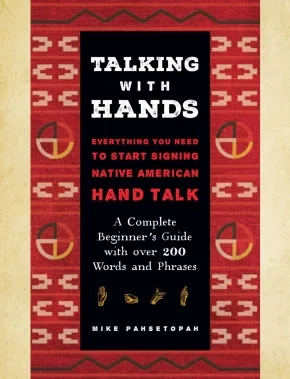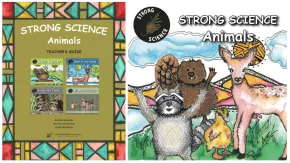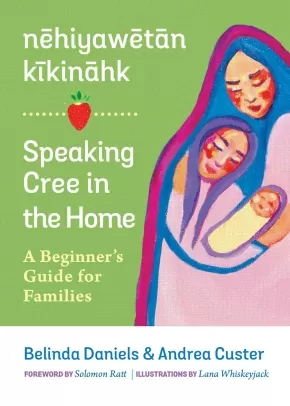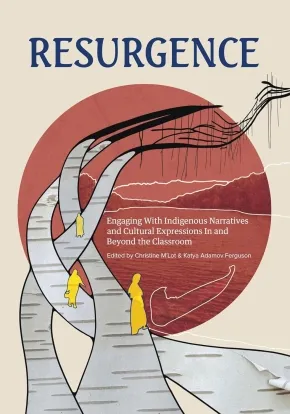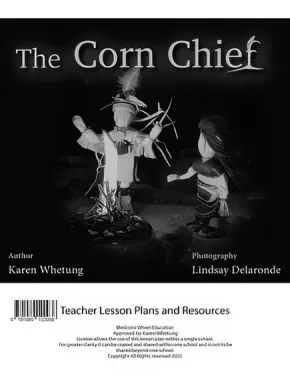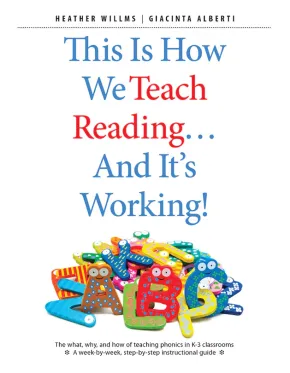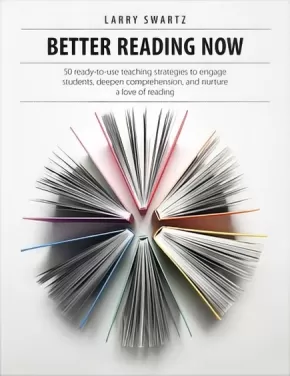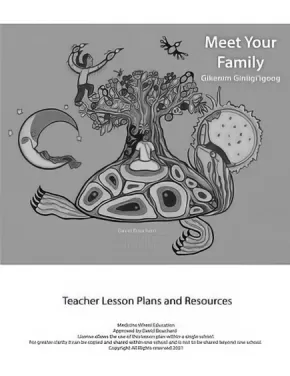
Literacy Resources
16
-
30
of
73 Results;
Sort By
Go To
of 5
Storyteller Skye: Teachings from My Ojibway Grandfather Teacher Lesson Plan
$7.99
Artists:
Format:
Paperback
Text Content Territories:
Indigenous Canadian; First Nations; Anishinaabeg; Ojibway;
ISBN / Barcode: 9781778540103
Synopsis:
Synopsis:
Teacher lesson plan that accompanies the book, Storyteller Skye. Includes comprehension questions, group activities, colouring pages, and more.
Have you ever wondered why Rabbit has such long ears? Or why Raccoon is wearing a mask? In this collection of funny and unique short stories, young Skye enlightens us in a number of Indigenous teachings, passed down to her from her Ojibway Grandfather. Through her natural gift of storytelling, Skye encourages other children to embrace the art and become storytellers, too!
Educator Information
The student resource, recommended for ages 5 to 9, can be found here: Storyteller Skye
This lesson plan is available in French: Skye la conteuse plan de cours: Enseignements de mon grand-pere ojibway
Additional Information
12 pages | 8.50" x 11.00" | Paper Packet
Strong Science - Animals Teacher's Guide
 $30.00
$30.00

Artists:
Format:
Coil Bound
Text Content Territories:
Indigenous Canadian; First Nations; Sioux; Lakota; Hunkpapa;
Grade Levels: 1;
ISBN / Barcode: 9781771746274
Synopsis:
Synopsis:
This teacher’s guide supports a language-based Science unit for early primary classrooms, using the sixteen titles in Strong Nations Publishing’s Strong Science - Animals series.
The unit introduces early primary students to four easily recognizable animals that live in or near many communities in Canada: beaver, black-tailed deer, mallard duck, and raccoon. While learning about the animals, students will gain knowledge and skills mandated by Ministry of Education Science curricula in Canadian provinces and territories.
In addition, this teacher’s guide addresses other curriculum areas— Language Arts, Math, Social Studies, and Art—and provides information to help develop an appreciation for and understanding of Indigenous cultures.
This teacher-friendly, comprehensive teacher’s guide provides:
• lesson plans to introduce the books in the Strong Science - Animals series;
• lesson plans to address knowledge and skills common to Canadian Science curricula;
• activities to integrate the unit across the curriculum;
• activities to wrap up the unit;
• reproducible activity pages.
Educator Information
The Strong Science - Animals series and teacher's guide is recommended for use with grade one students, but it may also be useful in kindergarten classes.
Additional Information
170 Pages | 8.5" x 11" | Coil Bound
Talking with Hands: Everything You Need to Start Signing Native American Hand Talk - A Complete Beginner's Guide with over 200 Words and Phrases
$32.99
Format:
Paperback
Text Content Territories:
Indigenous American; Native American;
Reading Level: N/A
ISBN / Barcode: 9781577153665
Synopsis:
Synopsis:
Explore Native American culture and learn Hand Talk, also known as Plains Indian Sign Language, Plains Sign Talk, and First Nation Sign Language.
In Talking with Hands, professional Native American dancer, storyteller, and educator Mike Pahsetopah reveals the beauty of Plains Indian Sign Language, which was once used as a common language between the Indigenous peoples of the region now generally known as the Great Plains of North America. The language was used for trade, but also for storytelling and by the Deaf community, making it a very common and useful tool in society. Today, only a few native speakers remain.
This beautifully designed book makes practicing Plains Indian Sign Language easy and engaging. Learn the proper positions and motions of this now-rare language with photos and descriptions throughout the pages. Follow along with diagrams to perfect your abilities.
Learn how to use your hands to convey the meanings of over 200 common words. In this detailed guide, you will learn to sign words like:
- Hungry
- Camp
- Evening
- Angry
- Fire
- Owl
- Together
- Brave
- And more
Honor and carry on the culture of the Plains peoples by learning the sign language they shared.
Additional Information
168 pages | 8.30" x 10.35" | 100+ color photos | Paperback
Teacher Resource Bundle: Strong Science - Animals
 $135.00 $150.00
$135.00 $150.00

Text Content Territories:
Indigenous Canadian; First Nations; Sioux; Lakota; Hunkpapa;
Grade Levels: Kindergarten; 1;
ISBN / Barcode: 9781771746663
Synopsis:
Synopsis:
This bundle includes one copy of each of the 16 Strong Science - Animals titles and the accompanying Strong Science: Animals - Teacher's Guide.
About the Strong Science - Animals Series
Strong Science - Animals is a language-based science series for primary students featuring animals that all Canadian students will recognize. Photographs and Indigenous artwork illustrate the series. Common learning objectives in science curricula across Canada are addressed, and suggestions for extending the learning to other curriculum areas, including Indigenous cultural awareness, language arts, math, and art, are included in the teacher’s guide. The sixteen books in this series are grouped into four levels that increase in complexity, designed to accommodate students with various reading abilities within a classroom. This feature facilitates the use of this series in literacy programs along with the Strong Readers series.
Books in this series are divided into four levels: Early Primary 1 (EP1); Early Primary 2 (EP2); Early Primary 3 (EP3); Early Primary 4 (EP4). Font size decreases as language complexity and word count increase across levels: EP1 books have approximately 40 words, EP2 books have approximately 60 words, EP3 books have approximately 80 words, and EP4 books have approximately 100 words.
Each book is 16 pages, 6.5" x 5.5", and paperback
About the Strong Science - Animals: Teacher's Guide
This teacher’s guide supports a language-based Science unit for early primary classrooms, using the sixteen titles in Strong Nations Publishing’s Strong Science - Animals series.
The unit introduces early primary students to four easily recognizable animals that live in or near many communities in Canada: beaver, black-tailed deer, mallard duck, and raccoon. While learning about the animals, students will gain knowledge and skills mandated by Ministry of Education Science curricula in Canadian provinces and territories.
In addition, this teacher’s guide addresses other curriculum areas— Language Arts, Math, Social Studies, and Art—and provides information to help develop an appreciation for and understanding of Indigenous cultures.
This teacher-friendly, comprehensive teacher’s guide provides:
• lesson plans to introduce the books in the Strong Science - Animals series;
• lesson plans to address knowledge and skills common to Canadian Science curricula;
• activities to integrate the unit across the curriculum;
• activities to wrap up the unit
The teacher's guide is 170 Pages, 8.5" x 11", and coil bound
Additional Information
Teacher Resource Bundle ISBN: 9781771746663
âhkami-nêhiyawêtân / Let’s Keep Speaking Cree
$32.95
Format:
Coil Bound
Text Content Territories:
Indigenous Canadian; First Nations; Cree (Nehiyawak);
ISBN / Barcode: 9780889778467
Synopsis:
Synopsis:
An important language resource that helps intermediate nêhiyawêtan learners begin to understand more advanced grammar of the language.
Let’s keep on speaking Cree:
In our language is our life;
Let’s keep on speaking Cree:
In our language is our identity.
Building on mâci-nêhiyawêwin / Beginning Cree, Solomon Ratt’s first influential Cree language resource, âhkami-nêhiyawêtân / Let’s Keep Speaking Cree helps intermediate nêhiyawêtan learners begin to understand more advanced grammar of the language. The textbook is more than a language textbook though: it includes a series of the author’s original stories written in Cree, complete with comprehension questions, making it ideal for self-study as well as classroom use.
Educator & Series Information
This book builds on mâci-nêhiyawêwin / Beginning Cree.
Latest Cree language workbook by highly respected author and educator Solomon Ratt, intended for intermediate readers/speakers/
learners
First title in the Continuing Language series, which will build upon our introductory Indigenous language learner texts
Includes sections on going to the doctor, Cree culture and values, protocols, faith, humility, teachings, and more.
Additional Information
304 pages | 8.50" x 11.00" | Spiral Bound
Animals Care for Mother Earth: A Teaching Resource for Personal Development
$16.95
Artists:
Format:
Paperback
Text Content Territories:
Indigenous Canadian; First Nations; Tsimshian (Ts'msysen);
ISBN / Barcode: 9781771745970
Synopsis:
Synopsis:
Animals Care for Mother Earth comprises six contemporary, interrelated stories and supporting resources for teachers. In the first story, animals cooperate to clean up a polluted pond. In subsequent stories, they care for each other in the aftermath of the pollution problem, demonstrating strength of character and social responsibility. This book can be used in elementary schools to teach—through storytelling—the value of personal strengths and community supports while incorporating Tsimshian language and knowledge into classroom lessons. It also provides many opportunities to extend the learning to other curriculum areas, including science, math, reading, writing, social studies, and art.
Reviews
"This teaching resource uses storytelling as a way to impart knowledge and initiate discussions and activities that support social and emotional learning.” – Canadian Teacher Magazine, Spring 2023 issue
Educator Information
Recommended for use with grades 1 to 6 (elementary students).
Everything educators need is included in this single work -- contemporary Indigenous stories to read aloud and explore with students, as well as story guides, a map, plant information pages, suggestions for classroom activities, discussion questions, inquiry activities, talking together points, information to support intergenerational or peer-to-peer learning, and connections to the Core Competencies and social and emotional learning (SEL) competencies.
Find a bundle for Animals Care for Mother Earth that includes the book and learning environment resources HERE!
Additional Information
32 Pages | 8.5" x 11" | ISBN: 9781771745970 | Paperback
Drum from the Heart Teacher Lesson Plan
$7.99
Format:
Paperback
Text Content Territories:
Indigenous Canadian; First Nations; Nuu-chah-nulth (Nootka);
ISBN / Barcode: 9781989122891
Synopsis:
Synopsis:
Teacher lesson plan that accompanies the book, Drum from the Heart. When he is gifted a handmade drum by his mother, Ren learns the teachings of the drum that she also passes down to him. Ren discovers that through this special drum, he is able to connect to his culture and find a confidence in his voice to joyfully share in singing the traditional songs of his Nuu-chah-nulth Nation.
Educator Information
Geared towards students up to grade 5. Includes comprehension questions, a section on how to make your own drum, and more.
Created by an Indigenous educator at Medicine Wheel Publishing with full approval from the author.
Highlights Indigenous perspectives and knowledge.
Find the student resource HERE!
This resource is available in French: Joue du tambour avec coeur plan de cours
Additional Information
12 pages | 8.50" x 11.00" | Paper Packet
nēhiyawētān kīkināhk / Speaking Cree in the Home
$19.95
Artists:
Format:
Paperback
Text Content Territories:
Indigenous Canadian; First Nations; Cree (Nehiyawak);
Reading Level: N/A
ISBN / Barcode: 9780889779006
Synopsis:
Synopsis:
A hands-on guide for parents and caregivers to develop best practices in revitalizing and teaching Cree to young children.
In nēhiyawētān kīkināhk / Speaking Cree in the Home, Belinda Daniels and Andrea Custer provide an introductory text to help families immerse themselves, their children, and their homes in nēhiyawēwin—the Cree language.
Despite the colonial attacks on Cree culture, language, and peoples, Custer and Daniels remind readers that the traditional ways of knowing and transferring knowledge to younger generations have not been lost and can be revived in the home, around the table, every day.
nēhiyawētān kīkināhk / Speaking Cree in the Home is an approachable, hands-on manual that helps to re-forge connections between identity, language, family, and community—by centering Indigenous knowledge and providing Cree learners and speakers with a practical guide to begin their own journey of reclaiming and revitalizing Cree in the home.
Readers are guided through methods for language learning, the basics of reading Cree and Standard Roman Orthography, pronunciation of vowels, engaging language-learning games, and examples of high-frequency words and phrases that can easily be incorporated into daily routines and taught to children young and old.
Reviews
“This is a welcome book for all who are interested in learning the Cree language, either for themselves alone or for themselves and their families. The book offers good guidance on the best practices in language learning based on the authors’ personal experiences in their respective language journeys.” —Solomon Ratt, author of mâci-nêhiyawêwin / Beginning Cree
“A major contribution, this book will be a useful resource in Cree classes, at both high school and university levels. But it is also useful for home use, as it describes the practical application of speaking Cree in the home and provides in an easy-to-read format and details a hands-on approach too.” —Dorothy Thunder (Plains Cree, Little Pine First Nation), Faculty of Native Studies, University of Alberta
“The activity-based learning lessons that are presented here should serve as a model not only for teaching the language in a family setting, but in any other formal and informal settings, because they cover all aspects of teaching and learning; the content, variety of methods, appropriate timing and setting. . . . The pioneering in Cree language acquisition and revival has begun and hopefully this book reaches all interested individuals.” —Ken Paupanekis, author of Pocket Cree: A Phrasebook for Nearly All Occasions
Additional Information
122 pages | 4.72" x 7.27" | Paperback
Resurgence: Engaging With Indigenous Narratives and Cultural Expressions In and Beyond the Classroom
$32.00
Editors:
Format:
Paperback
Text Content Territories:
Indigenous Canadian;
ISBN / Barcode: 9781774920008
Synopsis:
Synopsis:
A thoughtful guide to critical engagement with Indigenous literatures, perspectives, and teaching methods as well as ideas and action steps for bringing them into the classroom.
Resurgence is an inspiring collection of contemporary Indigenous poetry, art, and narratives that guides teachers in bridging existing K–12 curricula with Indigenous voices and pedagogies. Walk with us along the footbridge which seeks to:
- connect peoples and places
- link truth and reconciliation as ongoing processes
- symbolize the risk and urgency of this work for both Indigenous and settler educators
- engage tensions
- highlight the importance of balance, both of ideas and within ourselves
Through critical engagement with the texts, experienced educators Christine M’Lot and Katya Adamov Ferguson support readers in connecting with Indigenous narratives and perspectives, bringing Indigenous works in their classrooms, and creating more equitable and sustainable teaching practices.
In this resource, you will find
- diverse Indigenous voices, perspectives, and art forms from all across Turtle Island
- valuable concepts and methods that can be applied to the classroom and beyond
- practical action steps and resources for educators, parents, librarians, and administrators
Use this book as a springboard for your own learning journey or as a lively prompt for dialogue within your professional learning community.
Reviews
"Over the past several years, calls have come from across Canada for the inclusion of Indigenous worldviews and knowledge in all levels of education in the country. Enter...Resurgence." ––Windspeaker
Educator & Series Information
For use with K-12 curricula.
Contributors include KC Adams, Charlene Bearhead, Wilson Bearhead, Lisa Boivin, Nicola Campbell, Sara Florence Davidson, David A. Robertson, and Christina Lavalley Ruddy, and more!
Subjects / Themes: Education; Professional Development; Social Science; Indigenous Studies; Language Arts Disciplines; Study Teaching
This book is part of The Footbridge Series. This series aims to bridge curricular outcomes with Indigenous-centered content and perspectives from across Turtle Island. Like a footbridge, this series is intended to provide a path between Indigenous worldviews and the classroom, engaging differences, including tensions, and highlighting the importance of balance, all while helping teachers integrate Indigenous perspectives into multiple disciplines within the K-12 education system.
Table of Contents
Introduction
About This Book
About The Footbridge Series
Part 1: Resistance
Beyond Being Silenced by Sara Florence Davidson
- Connections
Poetry as Cultural Expression by Rita Bouvier
- Connections
T’seka Reflection by Lucy Hemphill
- Connections
Poetry by Louise Bernice Halfe
- Connections
Part 2: Resilience
Mental Health by David A. Robertson
- Connections
Writing as a Therapeutic Medium by Wanda John-Kehewin
- Connections
Birch Bark Technology by KC Adams
- Connections
Images and Health by Lisa Boivin
- Connections
Part 3: Restoring
Stories are Resurgence by Wilson Bearhead and Charlene Bearhead
- Connections
Why am I not on Star Trek? by Sonya Ballantyne
- Connections
Indigenous Spaces by Reanna Merasty
- Connections
Games as Resurgence by Elizabeth LaPensée
- Connections
Part 4: Reconnecting
Poems by Nicola I. Campbell
- Connections
Paths of Tradition by Russell Wallace
- Connections
Let the Children Play by Victoria McIntosh
- Connections
Ethnomathematics and Beading by Christina Ruddy
- Connections
The Contributors
Additional Resources
Index
Additional Information
224 pages | 7.00" x 10.00" | Paperback
Spelling Through Phonics: Special Edition
$27.00
Format:
Coil Bound
ISBN / Barcode: 9781774920329
Synopsis:
Synopsis:
This 40th anniversary edition of the beloved bestseller, Spelling Through Phonics, has the same compact and easy-to-use format thousands of educators know and love! With the McCrackens’ original spelling instruction program, this book provides detailed instructions and reproducibles to help you
- understand phonemic awareness, and how it helps children develop spelling and other literacy skills
- teach spelling easily, quickly, and efficiently
- integrate visual, auditory, and kinesthetic learning strategies
- effectively assess and react to students’ writing
- provide immediate feedback as part of spelling instruction
- organize students’ spelling practice within the school day
- introduce, practice, and review new words and sounds with students in grades 1–3
Help your students become proficient spellers, as well as confident readers and writers, with this developmentally appropriate framework.
Dedicated to the memory of The McCrackens, this 40th anniversary edition honors their invaluable contributions to English language arts and literacy instruction across North America.
Reviews
"I absolutely love the McCracken books and probably have all of them. I think they have one of the best spelling programs around. Honestly, I couldn’t live without Spelling Through Phonics, the little yellow book."— Grade Onederful
"In this fascinating and powerful little book, you will find the essence of effective and engaging instruction in spelling and phonics."— Shane Templeton
Educator Information
40th anniversary edition
Additional Information
200 pages | 5.87" x 9.00" | Student work samples throughout | Spiral Bound
Teacher Guide for the Sk'ad'a Stories Series: Intergenerational Learning and Storytelling in the Classroom
$23.95
Format:
Paperback
Text Content Territories:
Indigenous Canadian; First Nations; Haida;
ISBN / Barcode: 9781774920473
Synopsis:
Synopsis:
From the creators of Potlatch as Pedagogy: Learning Through Ceremony, the Sḵ'ad'a Stories series brings intergenerational learning to life. Haida children learn important life lessons from their Elders through real-life situations, cultural traditions, and experiences out on the land.
Written by Sḵ'ad'a Stories author Sara Florence Davidson and educator Katya Adamov Ferguson, the Teacher Guide for the Sḵ'ad'a Stories helps teachers engage their students through the lens of intergenerational learning and authentic experiences. This guide:
- outlines the Sḵ'ad'a principles found in the stories
- shows how to use the Sḵ'ad'a principles in your classroom
- provides the behind-the-scenes thinking of the authors and illustrator
- explains the significance of this series as part of Haida cultural resurgence and preservation
- provides critical perspectives on the impact of colonialism on Haida knowledges
- includes resources and inspirations for educators
This teacher guide is appropriate for all grade levels.
Educator Information
Table of Contents
Introduction
About the Sḵ’ad’a Stories Series
About This Guide
Part 1: Teacher Preparation: Understanding Cultural Contexts and the Emergence of Sḵ’ad’a
Haida Culture and Knowledges
- Haida Gwaii
- Silencing the Haida
- Thriving Haida Communities
Understanding Sḵ’ad’a
- Conversation With Sara
- Branch of Davidson Family Tree
Becoming “Story-Ready”
- Holistic Engagement with Stories
Part 2: Teacher Learning: Sḵ’ad’a for Educators
Significance of Series
Intergenerational Stories
Sḵ’ad’a for Educators and Professional Learning Communities
Sḵ’ad’a Principles
Part 3: Teacher Practice: Ideas for Engaging With the Sḵ’ad’a Stories
Sḵ’ad’a Principles in Practice
Themes and Connections
Engaging Sḵ’ad’a Stories With Students
- Interactive Read-Alouds
- Making Meaning From Stories
- Mentor Texts
- Critical Literacy
- Artifactual Literacies
Sampling of Sḵ’ad’a Activity Ideas
Book-Specific Supports—Jigging for Halibut With Tsinii
Book-Specific Supports—Learning to Carve Argillite
Book-Specific Supports—Returning to the Yakoun River
Book-Specific Supports—Dancing With Our Ancestors
Resources
References
Additional Information
48 pages | 8.50" x 11.00" | Paperback
The Corn Chief Teacher Lesson Plan
$7.99
Format:
Paperback
Text Content Territories:
Indigenous Canadian;
ISBN / Barcode: 9781989122938
Synopsis:
Synopsis:
This teacher lesson plan accompanies the book, The Corn Chief.
Synopsis of The Corn Chief:
With the wizened old chief set to step down, young Linny dreams of being chosen as his replacement. As she struggles to pass his test, Linny learns with the help of her family what it really takes to become chief...in the most unexpected way.
This story is told with the help of traditional corn husk dolls. Corn dolls protect the home, livestock, and personal wellness of the maker and their family. Corn husk dolls have been made in some Indigenous cultures since the beginning of corn agriculture more than one thousand years ago, and continue to be made today
Educator Information
Find the student resource here: The Corn Chief
Includes comprehension questions, colouring pages, an exploration of leadership, and more.
Lesson plan written by an Indigenous teacher from Saskatchewan along with the author and Medicine Wheel Publishing Team. It has been approved by author Karen Whetung.
Additional Information
14 pages | 8.50" x 11.00" | Paper packet
This Is How We Teach Reading? And It's Working!: The What, Why, and How of Teaching Phonics in K-3 Classrooms
$38.95
Format:
Paperback
ISBN / Barcode: 9781551383576
Synopsis:
Synopsis:
This timely book offers a clear and structured method for integrating explicit phonics instruction into K–3 classrooms. An essential guide for teaching reading, the book is grounded in the cutting-edge, evidence-based science of reading. It provides a flexible and effective step-by-step progression that covers the essential phonics skills that teachers have been asking for, and addresses the needs of busy, diverse classrooms. This blueprint to effective instruction explores screening, assessment, and intervention, as well as working with English language learners. Tools for implementation include high-impact activities, lesson templates, word lists, phoneme-grapheme grids, word ladders, and more.
Additional Information
272 pages | 8.38" x 10.80" | Paperback
Better Reading Now: 50 Ready-to-Use Teaching Strategies to Engage Students, Deepen Comprehension, and Nurture a Love of Reading
$28.95
Format:
Paperback
ISBN / Barcode: 9781551383491
Synopsis:
Synopsis:
Based on what we now know about reading, this practical book offers strategies in a consistent format that is easy for teachers to incorporate into their daily instruction. This grab-bag of classroom-tested activities allows teachers to choose what they need to meet the diverse needs of students from first to eighth grade. These strategies guide students through the reading process and build important comprehension skills through reading, talk, art, drama and more. These innovative ways to use the best children’s books inspire students to become enthusiastic and avid readers and to take the first giant step into becoming lifelong readers.
Educator Information
A grab-bag of ready-to-use strategies that promote a love of reading.
Shows how to use the best children's books in classrooms in new and innovative ways.
Illustrates how to balance great books that matter with screen time.
Additional Information
160 pages | 8.38" x 10.88"
Meet Your Family Teacher Lesson Plan
$7.99
Artists:
Format:
Paperback
Text Content Territories:
Indigenous Canadian; First Nations; Anishinaabeg; Ojibway;
ISBN / Barcode: 9781989122679
Synopsis:
Synopsis:
This is the Teacher Lesson Plan that accompanies the book Meet Your Family. Includes comprehension questions, group activities, wordsearch, colouring pages etc. Mother Earth, we come from her, we go to her, without her we wouldn't be here, she gives all of us life and because of her we are all one family. In many segments of Indigenous life we speak of Mother Earth, Father Sky, Grandfather Sun, and Grandmother Moon.
Meet Your Family is a rhythmic poem that will enlighten readers on how to view these important figures and share a greater concept of seeing the world as our natural family. Meet Your Family is presented in both English and Ojibway. An additional softcover book written in Ojibway with a phonetics guide is included inside this hardcover book.
Educator Information
Includes:
– Brainstorming Activity
– Letter Writing
– Comprehension Questions
– Colouring
– Crossword Puzzle
– Word Search
The license allows the use of this lesson plan within a single school. It can be copied and shared within one school but is not to be shared beyond that.
The student resource is available here: Meet Your Family / Gikenim Giniigi'igoog
Additional Information
12 pages | 8.50" x 11.00" | b&w illustrations
Sort By
Go To
of 5





